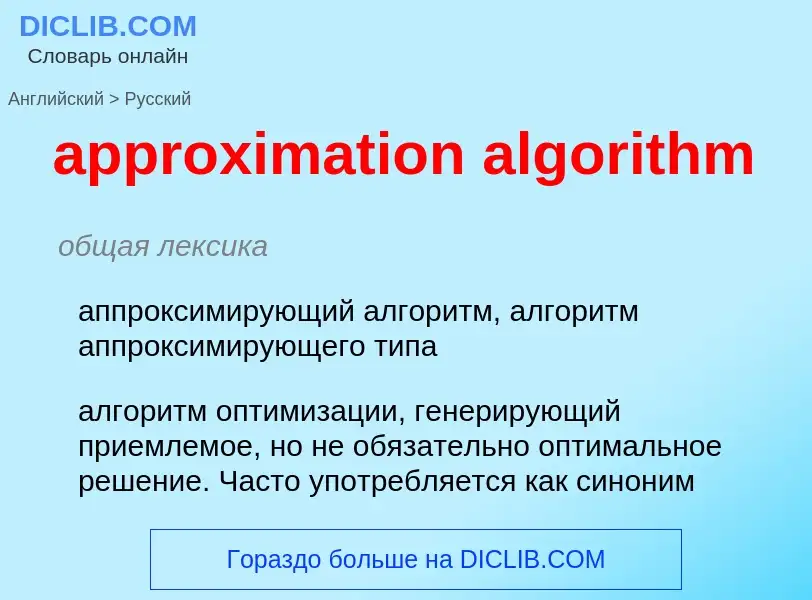Μετάφραση και ανάλυση λέξεων από την τεχνητή νοημοσύνη ChatGPT
Σε αυτήν τη σελίδα μπορείτε να λάβετε μια λεπτομερή ανάλυση μιας λέξης ή μιας φράσης, η οποία δημιουργήθηκε χρησιμοποιώντας το ChatGPT, την καλύτερη τεχνολογία τεχνητής νοημοσύνης μέχρι σήμερα:
- πώς χρησιμοποιείται η λέξη
- συχνότητα χρήσης
- χρησιμοποιείται πιο συχνά στον προφορικό ή γραπτό λόγο
- επιλογές μετάφρασης λέξεων
- παραδείγματα χρήσης (πολλές φράσεις με μετάφραση)
- ετυμολογία
approximation algorithm - translation to ρωσικά
общая лексика
аппроксимирующий алгоритм, алгоритм аппроксимирующего типа
алгоритм оптимизации, генерирующий приемлемое, но не обязательно оптимальное решение. Часто употребляется как синоним эвристического алгоритма
общая лексика
аппроксимируемость
Ορισμός
Βικιπαίδεια
In computer science and operations research, approximation algorithms are efficient algorithms that find approximate solutions to optimization problems (in particular NP-hard problems) with provable guarantees on the distance of the returned solution to the optimal one. Approximation algorithms naturally arise in the field of theoretical computer science as a consequence of the widely believed P ≠ NP conjecture. Under this conjecture, a wide class of optimization problems cannot be solved exactly in polynomial time. The field of approximation algorithms, therefore, tries to understand how closely it is possible to approximate optimal solutions to such problems in polynomial time. In an overwhelming majority of the cases, the guarantee of such algorithms is a multiplicative one expressed as an approximation ratio or approximation factor i.e., the optimal solution is always guaranteed to be within a (predetermined) multiplicative factor of the returned solution. However, there are also many approximation algorithms that provide an additive guarantee on the quality of the returned solution. A notable example of an approximation algorithm that provides both is the classic approximation algorithm of Lenstra, Shmoys and Tardos for scheduling on unrelated parallel machines.
The design and analysis of approximation algorithms crucially involves a mathematical proof certifying the quality of the returned solutions in the worst case. This distinguishes them from heuristics such as annealing or genetic algorithms, which find reasonably good solutions on some inputs, but provide no clear indication at the outset on when they may succeed or fail.
There is widespread interest in theoretical computer science to better understand the limits to which we can approximate certain famous optimization problems. For example, one of the long-standing open questions in computer science is to determine whether there is an algorithm that outperforms the 2-approximation for the Steiner Forest problem by Agrawal et al. The desire to understand hard optimization problems from the perspective of approximability is motivated by the discovery of surprising mathematical connections and broadly applicable techniques to design algorithms for hard optimization problems. One well-known example of the former is the Goemans–Williamson algorithm for maximum cut, which solves a graph theoretic problem using high dimensional geometry.

